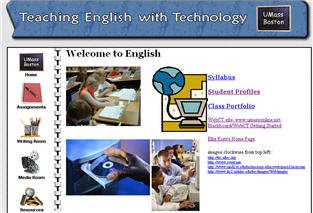Response to Week 3 readings on blogs
Knobel and Lankshear, in “Weblog Worlds,” raise some interesting questions for me. Working within the theoretical framework of New Literacy Studies, which sees the various literacies that people practice as being imbedded in specific social contexts, they examine instances of the current social practice of writing and reading weblogs, looking to see how “powerful writing” seems to be defined in the blogosphere. Power in the world of blogs is determined in part by having a lot of readers, but perhaps also by having a few readers (a circle of friends, or an affinity group with a common interest), who actively write back. They suggest that the writing that works in the blog world can be defined by an authentic purpose, a point of view, and the quality of presentation (including the idea that a blog should be easily accessible, and not require lengthy downloads of huge linked files), and they point to specific examples, such as the prize-winning blog, “little. yellow. different” [http://www.littleyellowdifferent.com/ ] written by a gay Asian-American, that have a real voice and stance. They argue that what they’ve found “calls into question” the usual composition definition of powerful writing, suggesting that what is typically taught as writing strategies (like the ones from my own comp book, Exploring Literacy) doesn’t capture these qualities—that powerful blogs typically command attention by breaking generic conventions, by hybridizing, rather than through such strategies as revision. And when the authors turn their attention to school blogs, to see if they can find evidence of powerful writing there—they don’t! Most school blogs are used for teacher postings of work and assignments or are performances of school tasks by students that could be done in any medium.
But when I look at the example of a class blog that I showed briefly in class, the one from Christian Pulver’s 101 class, at dcsurley@blogspot.com, I find lively writing on the parts of both teacher and students, even though the blog is obviously a class assignment and the students are responding to questions the teacher poses. But I think that both teacher and students are taking their discussion seriously—that this is an opportunity to extend the engagement of the class discussions, with a sense that other students are the real audience. Here’s one example from a student:
"I believe, that media is a “mirror” of society, because I the experience which non of you have, including the author of the introduction. I was born in a country( Soviet Union) where was no crimes, or murders on TV, but there were in reality, but no one was talking about them. One single example of Chernobyl catastrophe was cost many human life’s- media said nothing about it at that time on TV. Is this how exactly the author would like to broad cast the news- just don’t say anything , don’t panic, it could be worth……"
So school blogs don’t have to be empty and formula driven.
I’d also add that the blog itself is a new genre with its own conventions, and that those conventions can be explored openly by teacher and students through reading blogs and discussion them, and seeing why they might have arisen, and how one might gain attention of readers by altering them.
Course homepage

Course homepage
Thursday, 14 June 2007
Subscribe to:
Post Comments (Atom)
2 comments:
When I was reading through the Week Three Blog Readings, I got caught up in the blog of the young Iraqi woman. I read her first entry, thought it was really interesting to read about the life of a woman living in Iraq during this war and just kept on reading, listening to her tell the horrific stories of rape, torture, and murder of her fellow citizens. She was authentic, took a stance against the war, and had many detailed stories and examples to back up her beliefs. I was so engrossed in her blog and lost track of time.
I would think Knobel and Lankshear in "Weblog Worlds" would define her blog and writing as "powerful". When I think of school blogs and compare them to this woman's blog, I can definitely see where Knobel and Lankshear are coming from.
Most school blogs would probably be connected to classroom work or assignments-- already setting limits on "breaking with generic conventions" in my opinion. I also think discussions pertaining to classroom work lowers the reader audience and only includes those who are knowledgable on the subject being addressed.
If you think back to what Krause wrote when his blogging went "bad", he blamed himself partly for not setting "guidelines". He took the "organic" approach wanting to see what happens on the blog or where it takes them. And he said it failed miserably. Krause would probably say success in blogging might depend on being "formula driven". I'm not saying there are no school blogs with any "powerful writing", I just think school blogs might be at a disadvantage. Because of their structural guidelines, specific discussion topics, and dependency on student participations, school weblogs have a harder time being defined as "powerful writing", and therefore Knobel and Lankshear have a point.
But you make a good point too in saying the blog is a new genre and still being explored, so the possibilities are there to create some very powerful writing in a school blog.
Many institutions limit access to their online information. Making this information available will be an asset to all.
Post a Comment